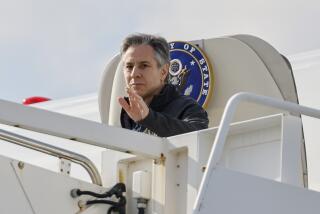Soviet Response Welcomed
WASHINGTON — Bush Administration officials said Sunday that the Soviets have responded enthusiastically to President Bush’s initiative unilaterally reducing nuclear weapons and called the prospects for a complementary reaction promising.
Secretary of Defense Dick Cheney, interviewed on ABC’s “This Week with David Brinkley,” said Bush telephoned both Soviet President Mikhail S. Gorbachev and Russian Federation President Boris N. Yeltsin before making his Oval Office address Friday night.
“They were enthusiastic then, and they’ve been enthusiastic since,” Cheney said. He cautioned, however, that it would be unrealistic to expect immediate proposals from the Soviets. “If somebody had hit us with this cold within 24 hours, we would not prepare a substantive response and say: ‘OK, we’ll take down the following systems.’ It will take some time for them to work it (out). But I think they will.”
National Security Adviser Brent Scowcroft also praised the Soviet reaction but echoed Cheney’s caution about specifics.
“We’d like to see him (Gorbachev) respond in like manner or at least in parallel manner to the proposals that the President made,” Scowcroft said on NBC’s “Meet the Press.” “This is a comprehensive proposal and to respond in 24 hours is too much to expect.”
The national security adviser also dismissed criticism that Bush’s omission of superior U.S. sea-launched missiles and targeting of land-based missiles--where Soviet nuclear forces have their main strength--could cause Moscow to hesitate.
“The Soviets have a very powerful sea-launched ballistic missile,” Scowcroft asserted. “And what we’re saying is: ‘Let’s deal with the weapons that are most destabilizing.’ ”
White House Chief of Staff John H. Sununu, completing a chorus of top Administration officials, said on CBS’ “Face the Nation” that Gorbachev must “go back and look at some details” but added that Bush was most anxious to time the U.S. approach “to take advantage of the first time in Soviet history where they (the Soviets) both could, or were inclined to, give a positive response.”
More to Read
Get the L.A. Times Politics newsletter
Deeply reported insights into legislation, politics and policy from Sacramento, Washington and beyond. In your inbox three times per week.
You may occasionally receive promotional content from the Los Angeles Times.










